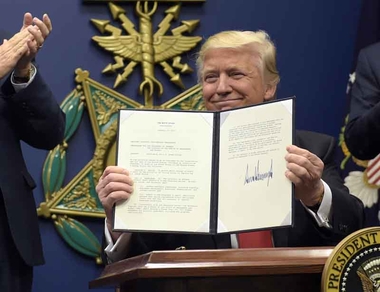Trump orders strict new refugee screening, citing terrorists

Washington (AP) — President Donald Trump has barred all refugees from entering the United States for four months, and indefinitely halted any from Syria, saying the ban is needed to keep out "radical Islamic terrorists."
The order Friday immediately suspended a program that last year resettled in the U.S. roughly 85,000 people displaced by war, political oppression, hunger and religious prejudice. Trump indefinitely blocked those fleeing Syria, where a civil war has raged, and imposed a 90-day ban on entry to the U.S. from seven Muslim majority nations.
"We want to ensure that we are not admitting into our country the very threats our soldiers are fighting overseas," Trump said as he signed the order at the Pentagon. "We only want to admit those into our country who will support our country and love deeply our people."
Trump said the halt in the refugee program was necessary to give agencies time to develop a stricter screening system. While the order did not spell out what additional steps he wants the departments of Homeland Security and State to take, the president directed officials to review the refugee application and approval process and find any more measures that could prevent those who pose a threat from using the refugee program.
The U.S. may admit refugees on a case-by-case basis during the freeze, and the government will continue to process requests from people claiming religious persecution, "provided that the religion of the individual is a minority religion in the individual's country."
In an interview with CBN News, Trump said persecuted Christians would be given priority in applying for refugee status.
"We are going to help them," Trump said. "They've been horribly treated."
The order was signed on Trump's most robust day of national security and foreign policy at the start of his presidency. He met with British Prime Minister Theresa May and had a lengthy phone call with Mexican President Enrique Pena Nieto.
As a candidate, Trump called for a temporary ban on all Muslim immigration to the U.S. He later shifted his focus to putting in place "extreme vetting" procedures to screen people coming to the U.S. from countries with terrorism ties.
The State Department said the three-month ban in the directive applied to Iraq, Syria, Iran, Sudan, Libya, Somalia and Yemen — all Muslim-majority nations.
The Council on American-Islamic Relations said it would challenge the constitutionality of the executive order.
"There is no evidence that refugees — the most thoroughly vetted of all people entering our nation — are a threat to national security," Lena F. Masri, the group's national litigation director. "This is an order that is based on bigotry, not reality."
During the past budget year, the U.S. accepted 84,995 refugees, including 12,587 people from Syria. President Barack Obama had set the refugee limit for this budget year at 110,000.
According to Trump's executive order, he plans to cut that to 50,000. Refugee processing was suspended in the immediate aftermath of the Sept. 11 attacks and restarted months later.
The president was applauded by House Speaker Paul Ryan, who said it was "time to re-evaluate and strengthen the visa-vetting process."
But many Democrats cast the measures as un-American.
"Tears are running down the cheeks of the Statue of Liberty tonight as a grand tradition of America, welcoming immigrants, that has existed since America was founded has been stomped upon," said Senate Democratic leader Chuck Schumer of New York.
Trump's order was signed on Holocaust Remembrance Day, which brought to mind the global effort to help refugees during World War II and its aftermath.
The order makes no mention of a plan to provide safe zones in Syria and the surrounding area. A draft of the order had directed the Pentagon and the State Department to produce a plan for safe zones in the war-torn Mideast nation.
The president's directive capped a hectic first week for Trump at the White House, giving Americans an initial look at how he intends to position the United States around the globe.
Earlier Friday, he hosted May at the White House for his first meeting with a world leader since taking office. Asked about whether he would revert back to Bush-era use of torture, Trump said he would defer to the views of Defense Secretary Jim Mattis.
"He has stated publicly that he does not necessarily believe in torture or waterboarding, or however you want to define it. ... I don't necessarily agree," Trump said. "But I would tell you that he will override because I'm giving him that power. He's an expert."
The Associated Press and other news organizations have obtained copies of a draft executive order signaling sweeping changes to U.S. interrogation and detention policy. The draft, which the White House said was not official, also requests recommendations on whether the U.S. should reopen CIA detention facilities outside the United States. Critics said the clandestine sites have marred America's image on the world stage.
Trump held firm on another matter of contention, trade and illegal immigration from Mexico. He told reporters he had a "very good call" with Pena Nieto earlier in the day, but he reaffirmed his belief that Mexico has "outnegotiated and beat us to a pulp" on trade — and that would change.
"We're no longer going to be the country that doesn't know what it's doing," he declared a day after the Mexican leader canceled his visit to Washington in response to Trump's plans to build a border wall and have Mexico pay for it.
By Ken Thomas, Associated Press. Copyright 2017 Associated Press. All rights reserved.
The Gayly – January 28, 2017 @ 6:35 a.m.





